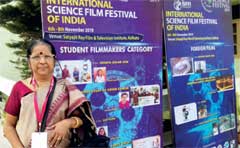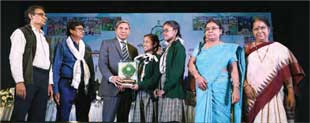Sreemati Ghosh
It was 30th November, 2018. The day to say good bye to all had finally arrived. I couldn’t really believe that I no longer had to be present in the school at 10 in the morning. I had thought of this moment on multiple occasions over the last one year and had prepared my mind to accept the inevitable reality of the coming days, but when it finally did come, I still couldn’t stop the tears from flowing down.
I used to teach in a government aided higher secondary school. The school was a part of my life for 38 years, of which 13 years I functioned as its administrative head. With limited resources, I successfully motivated my colleagues and transformed the dilapidated building into a school with an auditorium, library, computer, math and science laboratories, activity rooms with projectors, solar panels, rain harvesting pits and a small rooftop garden. The government grant (SSM, MP, MLA) of almost Rs. 1.5 crore helped me to do my best. Our school reached a level of high repute, catering mostly to first-generation learners.

So I led a busy life in school, but I did have some idea of how I might spend my retirement days. I would only take on work that would interest me and would choose flexible working schedules to work at a slower pace. This way I could compensate for the very busy 38 years, which were a mixed bag of responsibilities, challenges, highs and lows.
Much to my surprise, when I retired, I actually began missing the daily routine I was once tired of. I suddenly felt a deep sense of nothingness inside me and realized that I couldn’t wait forever for interesting work to come to me. I would need to make a beginning. But where and how to start looking for engagements in the kind of work I thought I would enjoy doing?
That’s when I came to know of the organization, “Bichitra Pathshala”*. What an unusual name I thought. (Bichitra in Bengali means unusual – unusual school.) Bichitra Pathshala designed programmes for school children and their focus was “learning with moving images”. While working with children was something up my alley, I had to learn the non-conventional methods this organization adopted to help children acquire knowledge. Bichitra Pathshala uses interactive methods to reach out to school students who enjoy the participatory activities, and in the process, pick up both useful skills and information.
After I started to work for Bichitra Pathshala in 2017, Vigyan Prasar, an autonomous organization under the Department of Science and Technology, decided to run programmes in collaboration with Bichitra Pathshala to familiarize students in using visual media communication tools through workshops in film making, script writing, video editing, GIF designs and macro photography.
My vocational engagements began with numerous such programmes organized by Bichitra Pathshala and Vigyan Prasar:
- Earth Reel, an annual environmental film making contest for school students in collaboration with iLEAD^ and Earth Day Network (EDN)@.
- Learning with Moving Images, a search for excellence in “Technology enabled teaching-learning design”, the annual teachers lesson plan competition.
- Bichitra Pathshala Annual lecture, delivered by eminent personalities engaged in the fields of both social science and science and technology.
- Iskule Bioscope, an in-school festival of Bengali cinema, a collaborative effort with The Sauce Brand Communication#.
- The Magic of My School, a history project enabling students in the process of critical thinking and creative expression.
- Tracing Roots: A fun-filled summer activity to keep the students creatively and meaningfully engaged. In this activity the students would learn to trace the migration routes of their parents and grandparents. This project would also help them understand why people migrate and to study how a big city like Kolkata assimilates the strains of diverse cultures brought in by the migrants.
- Action research project: An ongoing project studying the use of experimental as well as traditional tools in learning methods.

For someone who was raised in a conventional learning environment where rote learning was the norm, working on cleverly designed programmes that harnessed technology to teach has been quite the learning experience for me. But I discovered that there were constraints in universalizing these projects for students in vernacular medium schools which far out number private schools. These government aided school students miss out on novel skill based leaning methods. My experience so far was with these state funded schools which are spread out in the districts in great numbers and I started to actively think of programmes that could reach out to these students, both in the urban, semi urban and rural hinterlands. The pandemic induced lockdown had already prepared the base for the possibilities of reaching out to students using online platforms. Therefore, with the help of some young enthusiasts, I initiated some programmes which could be organized as workshops online. I also had help from many senior government officials of the state educational department.
We began a new outreach programme of workshops in mobile photography, using mobile phones as a useful tool in sharpening the skills of expression, learning both the technical aspects of good photography and refinement of artistic expressions.
Future plans involve workshops on vocal music, art and craft, dance, storytelling, sky watching, teaching-learning material development for teachers and students and various activity based learning. We also have plans to organize webinars by various eminent personalities to expose the students in hard to reach places to the world of knowledge.

But lack of finances is a major concern as these students are not in any position to pay for these workshops and the government or government sponsored school authorities mostly have no funds unlike the private schools.
At present this is my biggest challenge; continuing this work for the needy students of the remote districts of West Bengal.
Apart from my work with Bichitra Pathshala I am enjoying writing travelogues and popular scientific articles. I also work as the joint editor for the Bengali e-newsletter of Bichitra Pathshala. Well, I must say I am enjoying my retired life with a sense of great purpose and have my hands full with engagements of different kinds which not only expose me to the use of new skills but fulfill my wish as an educator.
* Bichitra Pathshala is an NGO formed on the request of teachers about a decade ago in 2010 to incorporate the use of visual media as a teaching aid in schools. The organization came into existence due to the efforts of a Jesuit Father, Gaston Roberge. It became a registered society in 2012.
^A college for media, management and professional studies in Kolkata.
@An NGO working to educate and activate the environmental movement worldwide.
# Advertising agency responsible for the media coverage of Iskule Bioscope.
The author retired as principal of a government sponsored school in Kolkata. Currently she is associated with Bichitra Pathshala. She has done her graduation in physiology from Presidency College, post graduation and B.Ed from University of Calcutta, Ph.D from University of Jadavpur and some postdoctoral research at Bose Institute as an Honorary Fellow. She can be reached at sreemati.ghosh303@gmail.com.
